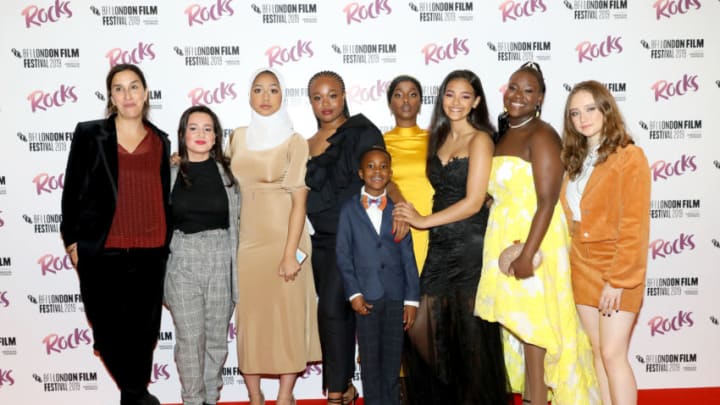Rocks wants to hearken back to other kitchen-sink dramas about teens, but it fails to say anything new for the Snapchat generation.
The children are our future, and, if movies are anything to go off of, they’re often more capable than proper adults. Numerous movies throughout the decades have focused on children growing up faster than they’ve needed to, usually in high-stakes dramas with moralistic messages. Director Sarah Gavron’s Rocks is a film that hopes to hearken back to director Andrea Arnold’s Fish Tank, but can’t seem to make us care for its leading lady and the questionable decisions she makes.
Rocks is the nickname for Shola (Bukky Bakray), a London teen who lives in council housing with her mother and little brother, Emmanuel (D’angelou Osei Kissiedu). Rocks spends her days doing makeup on her friends for pocket money and generally spending time on her phone. When her mother says goodbye to her one day, it is odd but not concerning — that is, until Rocks realizes her mother has left the family and might never return. The teen must figure out not only how to fend for herself, but for her little brother as well.
Rocks is a lesson in frustration, telling a captivating story in starts and stops. The world of council housing in Britain is generally a story told through white protagonists, so almost immediately, Rocks being a Black female is unique. She attends a school with girls of color, creating an insular world where racism and politics don’t enter in. And yet the movie almost seems afraid to comment on issues that would seem to directly affect a child like her.
When her mother leaves the family, Rocks and Emmanuel have to hide from social services, more so for fear of separation than anything relating to the rates of foster care and adoption for non-white children. A character later ends up being the lone Black person in a sea of white faces yet Gavron doesn’t seem to notice enough to comment on it.
Instead, Rocks falls into the trap of being 93 minutes of sadness and gloom. Bakray holds her own as Rocks but the movie doesn’t give audiences much of a reason to care for her. She has a passion and interest in makeup, but that’s about it. The structure of scenes repeat themselves so often — Rocks going from A to B with her brother, occasionally returning home — that the movie meanders endlessly for its runtime, all the while never giving us a way to connect with Rocks. She has opportunities to tell people of her plight but doesn’t, though it’s unclear whether this is shame or not because the character never speaks about her feelings. We learn more about her through others, like her best friend Sumaya (Kosar Ali), but once Rocks is alone, there’s little to cling to.
To complicate matters, Gavron tries to showcase the movie the way Rocks and her crew would: through social media. At random points throughout — generally, when the girls are all together — the aspect ratio will transition to Instagram size. This would be interesting if there was consistency to it, but it ends up stopping the serious narrative completely.
Rocks won’t set the world on fire despite Bakray’s interesting performance and young Kissiedu being the cutest thing in the world. The film is a missed opportunity to say something new about poverty in England.
